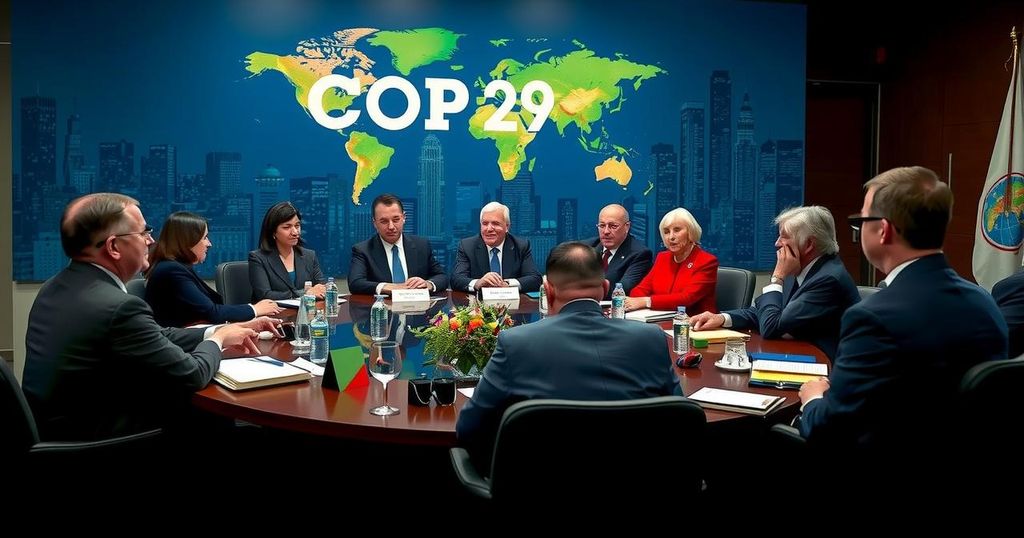COP29: Prioritizing Lives Over Profits in Climate Financing

COP29 in Baku emphasizes that developed nations must prioritize human lives over profits in climate financing. Recent floods in Spain highlight the need for substantial support to address climate impacts in vulnerable countries. There is an urgent requirement for new grant-based financial commitments rather than relying on debt or private sector options, which may not address vital climate needs.
The ongoing discussions at COP29 in Baku, Azerbaijan, reveal a critical need for developed nations to prioritize human lives over financial gains as they negotiate a new climate finance agreement. The recent devastating floods in Spain illustrate the rising threats of climate change, compelling nations to act compassionately and strategically. Developed countries must fulfill their commitments by mobilizing substantial financial resources to support vulnerable nations, rather than relying on unpredictable private sector funding or imposing further financial burdens through debt. At the Baku conference, it is crucial for world leaders to recognize the urgency of substantial climate financing. The previous commitment to provide $100 billion annually for climate action was only met in 2022, highlighting an ongoing delay and insufficiency that fails to meet the trillion-dollar needs of developing nations. There exists a pressing requirement for reliable and generous funding, specifically designed to aid those facing the brunt of climate disasters. Proposals have been made, but responsiveness from wealthier nations remains insufficient, undermining not only the trust among participating countries but also the integrity of international agreements like the Paris Agreement. Developed countries are at risk of repeating historical mistakes if they insist on basing the contributions to the new climate finance goal predominantly on the private sector’s involvement. Many pivotal projects necessary for climate adaptation are not profitable, thus necessitating direct, grant-based financial support instead of loans that further exacerbate existing debt crises. The so-called “Wall Street Climate Consensus,” which favors the privatization of climate financing, ultimately transfers risk to vulnerable states while protecting private interests. This approach contradicts the principles of climate justice and diminishes the potential for genuine support toward the countries that need it the most. In conclusion, it is imperative for developed nations to demonstrate leadership by securing a robust climate finance agreement that emphasizes equity and collective responsibility. The current negotiations present an opportunity for these nations to rectify past failures and ensure that future actions are centered on the welfare of the most affected communities. The eyes of the world are focused on Baku, and the choices made here will have profound and lasting impacts on global climate action for years to come.
The need for a comprehensive climate finance deal is amplified by the increasing frequency of climate catastrophes, as exemplified by the recent severe flooding in Spain that resulted in over 200 fatalities. This event highlights both the inadequacies of developed nations’ preparedness and response capabilities and raises questions about the resilience of developing countries facing similar or greater challenges. The COP29 meeting in Baku serves as a key moment for global leaders to forge a new agreement that requires substantial financial commitments to develop nations that are lacking the resources to address their climate-related needs. Such a commitment is essential not only for environmental justice but also for global economic equity.
The negotiations at COP29 spotlight the pressing need for developed economies to shift their focus from profit-driven strategies to prioritizing human welfare through effective climate financing. By addressing the urgent needs of developing nations and ensuring that funding is adequate, unconditional, and equitable, the international community can not only uphold commitments made in previous climate agreements but also strengthen collaboration towards a sustainable future. The outcome of these discussions will define the path forward in the fight against climate change and will be critically evaluated by future generations.
Original Source: www.aljazeera.com






